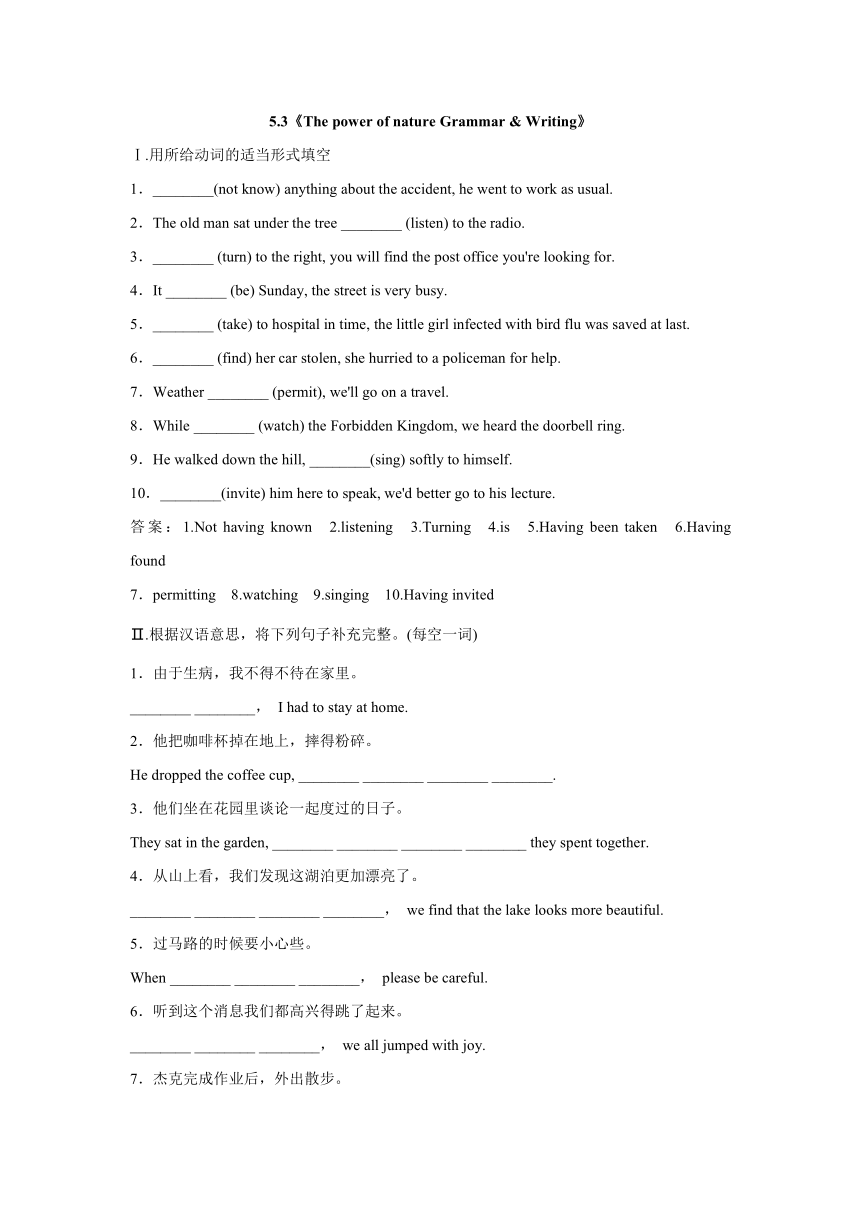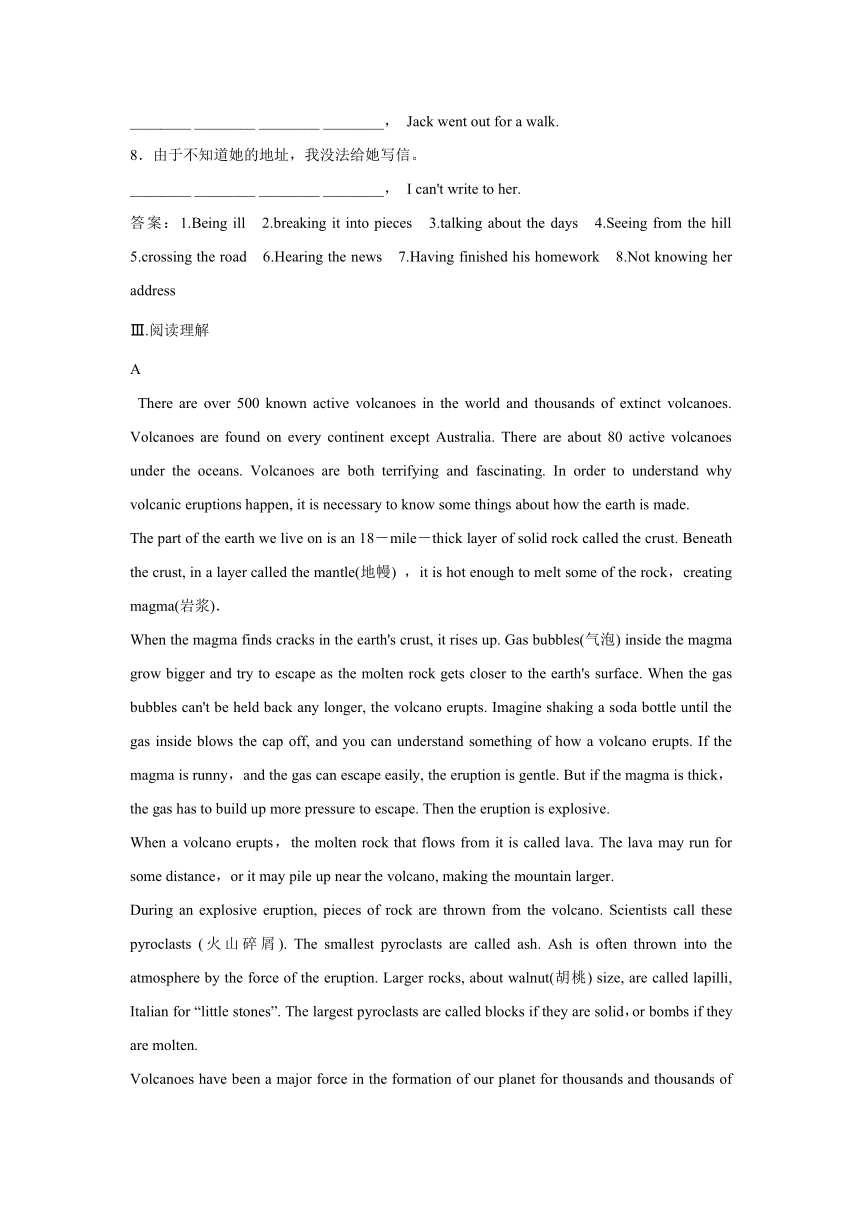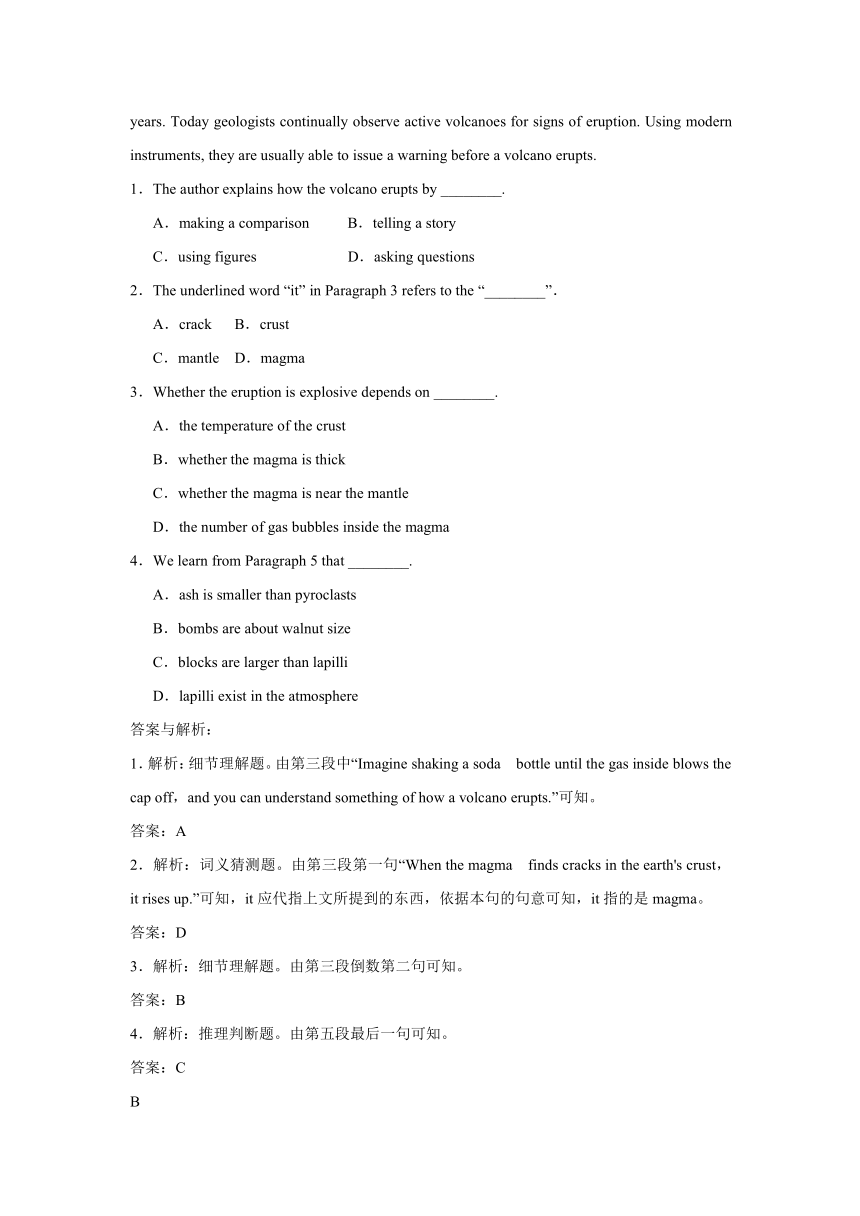2015-2016学年高中英语 5.3《The power of nature Grammar & Writing》练习(含部分答案解析)
文档属性
| 名称 | 2015-2016学年高中英语 5.3《The power of nature Grammar & Writing》练习(含部分答案解析) |  | |
| 格式 | zip | ||
| 文件大小 | 548.1KB | ||
| 资源类型 | 教案 | ||
| 版本资源 | 人教版(新课程标准) | ||
| 科目 | 英语 | ||
| 更新时间 | 2016-04-20 11:51:54 | ||
图片预览



文档简介
5.3《The power of nature Grammar & Writing》
Ⅰ.用所给动词的适当形式填空
1.________(not know) anything about the accident, he went to work as usual.
2.The old man sat under the tree ________ (listen) to the radio.
3.________ (turn) to the right, you will find the post office you're looking for.
4.It ________ (be) Sunday, the street is very busy.
5.________ (take) to hospital in time, the little girl infected with bird flu was saved at last.
6.________ (find) her car stolen, she hurried to a policeman for help.
7.Weather ________ (permit), we'll go on a travel.
8.While ________ (watch) the Forbidden Kingdom, we heard the doorbell ring.
9.He walked down the hill, ________(sing) softly to himself.
10.________(invite) him here to speak, we'd better go to his lecture.
答案:1.Not having known 2.listening 3.Turning 4.is 5.Having been taken 6.Having found
7.permitting 8.watching 9.singing 10.Having invited
Ⅱ.根据汉语意思,将下列句子补充完整。(每空一词)
1.由于生病,我不得不待在家里。
________ ________, I had to stay at home.
2.他把咖啡杯掉在地上,摔得粉碎。
He dropped the coffee cup, ________ ________ ________ ________.
3.他们坐在花园里谈论一起度过的日子。
They sat in the garden, ________ ________ ________ ________ they spent together.
4.从山上看,我们发现这湖泊更加漂亮了。
________ ________ ________ ________, we find that the lake looks more beautiful.
5.过马路的时候要小心些。
When ________ ________ ________, please be careful.
6.听到这个消息我们都高兴得跳了起来。
________ ________ ________, we all jumped with joy.
7.杰克完成作业后,外出散步。
________ ________ ________ ________, Jack went out for a walk.
8.由于不知道她的地址,我没法给她写信。
________ ________ ________ ________, I can't write to her.
答案:1.Being ill 2.breaking it into pieces 3.talking about the days 4.Seeing from the hill 5.crossing the road 6.Hearing the news 7.Having finished his homework 8.Not knowing her address
Ⅲ.阅读理解
A
There are over 500 known active volcanoes in the world and thousands of extinct volcanoes. Volcanoes are found on every continent except Australia. There are about 80 active volcanoes under the oceans. Volcanoes are both terrifying and fascinating. In order to understand why volcanic eruptions happen, it is necessary to know some things about how the earth is made.
The part of the earth we live on is an 18-mile-thick layer of solid rock called the crust. Beneath the crust, in a layer called the mantle(地幔) ,it is hot enough to melt some of the rock,creating magma(岩浆).
When the magma finds cracks in the earth's crust, it rises up. Gas bubbles(气泡) inside the magma grow bigger and try to escape as the molten rock gets closer to the earth's surface. When the gas bubbles can't be held back any longer, the volcano erupts. Imagine shaking a soda bottle until the gas inside blows the cap off, and you can understand something of how a volcano erupts. If the magma is runny,and the gas can escape easily, the eruption is gentle. But if the magma is thick,the gas has to build up more pressure to escape. Then the eruption is explosive.
When a volcano erupts,the molten rock that flows from it is called lava. The lava may run for some distance,or it may pile up near the volcano, making the mountain larger.
During an explosive eruption, pieces of rock are thrown from the volcano. Scientists call these pyroclasts (火山碎屑). The smallest pyroclasts are called ash. Ash is often thrown into the atmosphere by the force of the eruption. Larger rocks, about walnut(胡桃) size, are called lapilli, Italian for “little stones”. The largest pyroclasts are called blocks if they are solid,or bombs if they are molten.
Volcanoes have been a major force in the formation of our planet for thousands and thousands of years. Today geologists continually observe active volcanoes for signs of eruption. Using modern instruments, they are usually able to issue a warning before a volcano erupts.
1.The author explains how the volcano erupts by ________.
A.making a comparison B.telling a story
C.using figures D.asking questions
2.The underlined word “it” in Paragraph 3 refers to the “________”.
A.crack B.crust
C.mantle D.magma
3.Whether the eruption is explosive depends on ________.
A.the temperature of the crust
B.whether the magma is thick
C.whether the magma is near the mantle
D.the number of gas bubbles inside the magma
4.We learn from Paragraph 5 that ________.
A.ash is smaller than pyroclasts
B.bombs are about walnut size
C.blocks are larger than lapilli
D.lapilli exist in the atmosphere
答案与解析:
1.解析:细节理解题。由第三段中“Imagine shaking a soda bottle until the gas inside blows the cap off,and you can understand something of how a volcano erupts.”可知。
答案:A
2.解析:词义猜测题。由第三段第一句“When the magma finds cracks in the earth's crust,it rises up.”可知,it应代指上文所提到的东西,依据本句的句意可知,it指的是magma。
答案:D
3.解析:细节理解题。由第三段倒数第二句可知。
答案:B
4.解析:推理判断题。由第五段最后一句可知。
答案:C
B
Check out our tsunami facts and learn some interesting information related to these great walls of water that can cause so much destruction. Find out what causes tsunamis and read about some recent examples of tsunamis that have occurred around the globe.
The Japanese word for tsunami means harbor wave.
Tsunamis are sometimes referred to as tidal (受潮汐影响的) waves but this term has fallen out of favour because tsunamis are not related to tides.
Tsunamis are huge waves of water that are usually caused by earthquakes or volcanic eruptions.
As a tsunami approaches the shore(海岸), water may move back from the coast. If it is shallow(浅的) enough the water may be pulled back hundreds of metres. If you are in the area, you can know that a tsunami is on the way when you see this phenomenon.
Regions in tsunami danger zones often have warning systems in place to give people as much time as possible to move to a safe place.
When tsunamis hit shallow water (often near the coast) ,they slow down but increase in height.
An earthquake in the Indian Ocean off Indonesia in December 2004 caused a tsunami that killed over 200,000 people in 14 countries.
In March 2011, the Tohoku earthquake off the eastern coast of Japan caused a tsunami that was a major factor in the death of over 15,000 people.
The tsunami waves created by the Tohoku earthquake reached heights of over 40 metres in some areas, wiping out coastal towns and causing a number of nuclear accidents.
5.How many causes of tsunamis are mentioned in the text
A.One. B.Two.
C.Three. D.Four.
6.In the Tohoku earthquake over 15,000 people died mainly because of ________.
A.the earthquake itself
B.the lack of warning systems
C.the tsunami caused by the earthquake
D.the nuclear accidents caused by the tsunami
7.What do we learn from the text
A.The Japanese invented the term “tidal waves”.
B.The term “tidal waves” is used more often than tsunami.
C.When tsunamis slow down, their waves can reach 40 metres.
D.When hitting shallow water, tsunamis will rise higher.
8.The text is developed mainly by ________.
A.listing some facts
B.giving some explanations of the term
C.providing some numbers
D.making some comparisons
答案与解析:
5.解析:细节理解题。根据第四段可知文章提到造成海啸的两个原因:地震和火山爆发。
答案:B
6.解析:细节理解题。根据倒数第二段的“...the Tohoku earthquake off the eastern coast of Japan caused a tsunami that was a major factor in the death of over 15,000 people.”可知答案。
答案:C
7.解析:推理判断题。根据倒数第四段的“...they slow down but increase in height.”可知答案。
答案:D
8.解析:细节理解题。文章列举了世界上发生的几起海啸来说明其危害。
答案:A
Ⅳ.短文改错
The long-desired winter vacation arrived in the end. As soon as the bell rang, announced the end of the class, we couldn't wait to rush out of the classroom. Half an hour late, my good friend Li Ming and I were on the way back home. Such crowded was the bus we took that they had to stand. Thinking of the coming Spring Festival and the four-weeks stay with parents, we both felt exciting. All of a sudden, I saw a man picking an old lady's pocket. With help of Li Ming, I caught the thief and force him to give back the purse to the lady. The thief was take away by the police. Praised by other passengers, and we felt proud of what we had done.
答案:
The long-desired winter vacation arrived in the end. As soon as the bell rang, the end of the class, we couldn't wait to rush out of the classroom. Half an hour , my good friend Li Ming and I were on the way back home. crowded was the bus we took that had to stand. Thinking of the coming Spring Festival and the stay with parents, we both felt . All of a sudden, I saw a man picking an old lady's pocket. With help of Li Ming, I caught the thief and him to give back the purse to the lady. The thief was away by the police. Praised by other passengers, we felt proud of what we had done.
Ⅰ.用所给动词的适当形式填空
1.________(not know) anything about the accident, he went to work as usual.
2.The old man sat under the tree ________ (listen) to the radio.
3.________ (turn) to the right, you will find the post office you're looking for.
4.It ________ (be) Sunday, the street is very busy.
5.________ (take) to hospital in time, the little girl infected with bird flu was saved at last.
6.________ (find) her car stolen, she hurried to a policeman for help.
7.Weather ________ (permit), we'll go on a travel.
8.While ________ (watch) the Forbidden Kingdom, we heard the doorbell ring.
9.He walked down the hill, ________(sing) softly to himself.
10.________(invite) him here to speak, we'd better go to his lecture.
答案:1.Not having known 2.listening 3.Turning 4.is 5.Having been taken 6.Having found
7.permitting 8.watching 9.singing 10.Having invited
Ⅱ.根据汉语意思,将下列句子补充完整。(每空一词)
1.由于生病,我不得不待在家里。
________ ________, I had to stay at home.
2.他把咖啡杯掉在地上,摔得粉碎。
He dropped the coffee cup, ________ ________ ________ ________.
3.他们坐在花园里谈论一起度过的日子。
They sat in the garden, ________ ________ ________ ________ they spent together.
4.从山上看,我们发现这湖泊更加漂亮了。
________ ________ ________ ________, we find that the lake looks more beautiful.
5.过马路的时候要小心些。
When ________ ________ ________, please be careful.
6.听到这个消息我们都高兴得跳了起来。
________ ________ ________, we all jumped with joy.
7.杰克完成作业后,外出散步。
________ ________ ________ ________, Jack went out for a walk.
8.由于不知道她的地址,我没法给她写信。
________ ________ ________ ________, I can't write to her.
答案:1.Being ill 2.breaking it into pieces 3.talking about the days 4.Seeing from the hill 5.crossing the road 6.Hearing the news 7.Having finished his homework 8.Not knowing her address
Ⅲ.阅读理解
A
There are over 500 known active volcanoes in the world and thousands of extinct volcanoes. Volcanoes are found on every continent except Australia. There are about 80 active volcanoes under the oceans. Volcanoes are both terrifying and fascinating. In order to understand why volcanic eruptions happen, it is necessary to know some things about how the earth is made.
The part of the earth we live on is an 18-mile-thick layer of solid rock called the crust. Beneath the crust, in a layer called the mantle(地幔) ,it is hot enough to melt some of the rock,creating magma(岩浆).
When the magma finds cracks in the earth's crust, it rises up. Gas bubbles(气泡) inside the magma grow bigger and try to escape as the molten rock gets closer to the earth's surface. When the gas bubbles can't be held back any longer, the volcano erupts. Imagine shaking a soda bottle until the gas inside blows the cap off, and you can understand something of how a volcano erupts. If the magma is runny,and the gas can escape easily, the eruption is gentle. But if the magma is thick,the gas has to build up more pressure to escape. Then the eruption is explosive.
When a volcano erupts,the molten rock that flows from it is called lava. The lava may run for some distance,or it may pile up near the volcano, making the mountain larger.
During an explosive eruption, pieces of rock are thrown from the volcano. Scientists call these pyroclasts (火山碎屑). The smallest pyroclasts are called ash. Ash is often thrown into the atmosphere by the force of the eruption. Larger rocks, about walnut(胡桃) size, are called lapilli, Italian for “little stones”. The largest pyroclasts are called blocks if they are solid,or bombs if they are molten.
Volcanoes have been a major force in the formation of our planet for thousands and thousands of years. Today geologists continually observe active volcanoes for signs of eruption. Using modern instruments, they are usually able to issue a warning before a volcano erupts.
1.The author explains how the volcano erupts by ________.
A.making a comparison B.telling a story
C.using figures D.asking questions
2.The underlined word “it” in Paragraph 3 refers to the “________”.
A.crack B.crust
C.mantle D.magma
3.Whether the eruption is explosive depends on ________.
A.the temperature of the crust
B.whether the magma is thick
C.whether the magma is near the mantle
D.the number of gas bubbles inside the magma
4.We learn from Paragraph 5 that ________.
A.ash is smaller than pyroclasts
B.bombs are about walnut size
C.blocks are larger than lapilli
D.lapilli exist in the atmosphere
答案与解析:
1.解析:细节理解题。由第三段中“Imagine shaking a soda bottle until the gas inside blows the cap off,and you can understand something of how a volcano erupts.”可知。
答案:A
2.解析:词义猜测题。由第三段第一句“When the magma finds cracks in the earth's crust,it rises up.”可知,it应代指上文所提到的东西,依据本句的句意可知,it指的是magma。
答案:D
3.解析:细节理解题。由第三段倒数第二句可知。
答案:B
4.解析:推理判断题。由第五段最后一句可知。
答案:C
B
Check out our tsunami facts and learn some interesting information related to these great walls of water that can cause so much destruction. Find out what causes tsunamis and read about some recent examples of tsunamis that have occurred around the globe.
The Japanese word for tsunami means harbor wave.
Tsunamis are sometimes referred to as tidal (受潮汐影响的) waves but this term has fallen out of favour because tsunamis are not related to tides.
Tsunamis are huge waves of water that are usually caused by earthquakes or volcanic eruptions.
As a tsunami approaches the shore(海岸), water may move back from the coast. If it is shallow(浅的) enough the water may be pulled back hundreds of metres. If you are in the area, you can know that a tsunami is on the way when you see this phenomenon.
Regions in tsunami danger zones often have warning systems in place to give people as much time as possible to move to a safe place.
When tsunamis hit shallow water (often near the coast) ,they slow down but increase in height.
An earthquake in the Indian Ocean off Indonesia in December 2004 caused a tsunami that killed over 200,000 people in 14 countries.
In March 2011, the Tohoku earthquake off the eastern coast of Japan caused a tsunami that was a major factor in the death of over 15,000 people.
The tsunami waves created by the Tohoku earthquake reached heights of over 40 metres in some areas, wiping out coastal towns and causing a number of nuclear accidents.
5.How many causes of tsunamis are mentioned in the text
A.One. B.Two.
C.Three. D.Four.
6.In the Tohoku earthquake over 15,000 people died mainly because of ________.
A.the earthquake itself
B.the lack of warning systems
C.the tsunami caused by the earthquake
D.the nuclear accidents caused by the tsunami
7.What do we learn from the text
A.The Japanese invented the term “tidal waves”.
B.The term “tidal waves” is used more often than tsunami.
C.When tsunamis slow down, their waves can reach 40 metres.
D.When hitting shallow water, tsunamis will rise higher.
8.The text is developed mainly by ________.
A.listing some facts
B.giving some explanations of the term
C.providing some numbers
D.making some comparisons
答案与解析:
5.解析:细节理解题。根据第四段可知文章提到造成海啸的两个原因:地震和火山爆发。
答案:B
6.解析:细节理解题。根据倒数第二段的“...the Tohoku earthquake off the eastern coast of Japan caused a tsunami that was a major factor in the death of over 15,000 people.”可知答案。
答案:C
7.解析:推理判断题。根据倒数第四段的“...they slow down but increase in height.”可知答案。
答案:D
8.解析:细节理解题。文章列举了世界上发生的几起海啸来说明其危害。
答案:A
Ⅳ.短文改错
The long-desired winter vacation arrived in the end. As soon as the bell rang, announced the end of the class, we couldn't wait to rush out of the classroom. Half an hour late, my good friend Li Ming and I were on the way back home. Such crowded was the bus we took that they had to stand. Thinking of the coming Spring Festival and the four-weeks stay with parents, we both felt exciting. All of a sudden, I saw a man picking an old lady's pocket. With help of Li Ming, I caught the thief and force him to give back the purse to the lady. The thief was take away by the police. Praised by other passengers, and we felt proud of what we had done.
答案:
The long-desired winter vacation arrived in the end. As soon as the bell rang, the end of the class, we couldn't wait to rush out of the classroom. Half an hour , my good friend Li Ming and I were on the way back home. crowded was the bus we took that had to stand. Thinking of the coming Spring Festival and the stay with parents, we both felt . All of a sudden, I saw a man picking an old lady's pocket. With help of Li Ming, I caught the thief and him to give back the purse to the lady. The thief was away by the police. Praised by other passengers, we felt proud of what we had done.
